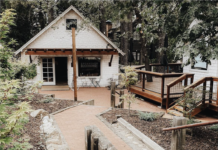Only 19 retailer and 50 cultivation permits will be issued this year
Riverside County will see a change in the profile of licensed businesses in its unincorporated areas. A limited number of cannabis cultivation, commercial cannabis retail sales and microbusiness permits will be issued after “interested parties” complete a preregistration process, and then complete a request for proposal.
The window for preregistration closed on Feb. 15, 2019. Those who preregistered were urged to attend “Interested Party Meetings” at which county staff explained how applications would be evaluated and ranked. Applicants who completed the preregistration process have until 4 p.m. Friday, April 12, to submit RFPs. No late applications will be accepted, and the top 19 ranked applicants for retail and 50 for cultivation will be issued permits in this first year.
For Idyllwild and its business profile of small mom and pop enterprises, for the most part all locally owned and operated, opening of retail cannabis shops with off-Hill owners has the potential to change the small town business vibe. And it is possible, because of ranking metrics that consider whether a potential business is “local,” that little will change.
Cannabis retail and cultivator permits will be scored using a metric with points to be allocated according to categories determined at the Interested Party Meetings.
Scoring categories include having a business plan; a planned location; a “good neighbor” community development plan (actions to benefit the community); security plan; odor control methods (if applicable); whether applicant is a community based local enterprise; steps to protect the environment; and a developed labor and employment plan.
Criminal history background checks are required for both the business and property owners. Scoring will be performed by a third-party contractor and the county. Proposals with a combined minimum score of 80 percent, along with those having passed background screenings, will be ranked from highest to lowest. The highest 19 for retail and 50 for cultivation will be “ratified” by the Riverside County Board of Supervisors, allowing them to move forward to additional land use and development requirements and processes.
Moving on to the land use permit process does not guarantee a county business license. Applicants must then apply for a Conditional Use Permit and other applications as required.
Those applicants who scored 80 percent or more, but were not part of the 19 or 50, would be put on a waiting list for future processing as the county determines after testing this first year’s permitting processes.
The many hurdles needed to receive a commercial cannabis permit are intended to test the approval parameters and requirements, and advance only the most thorough and well-documented applications.
District 3, home of Idyllwild and Pine Cove, has the largest number of interested parties authorized to submit RFPs — 35 for retail, 29 for cultivation and 12 for microbusinesses, defined as one operating in three of four permitted areas (distributor, manufacturer, retailer and cultivator). Countywide, in the unincorporated areas, there are 118 retail interested parties, 62 for cultivation and 65 for microbusiness.
All county applicants must be eligible to obtain state cannabis business licenses, enter into negotiated development agreements with the county, be age 21 or older, complete background checks, and rectify code violations in planned locations before obtaining a use permit.
Prospective cannabis business owners must provide a business name, owner name, description of cannabis use on property, statement of qualifications, business plan and odor abatement plan (if business is cultivation), and confirm that business meets setback requirements for sensitive uses.
Applicants must demonstrate that the proposed business location has the correct zoning to allow cannabis use, and if not within a zone that allows the use, a change of zone will be required; list all enforcement actions against the property; provide a neighborhood compatibility plan; and describe how product meets all applicable safety standards.
All RFP response packages will be reviewed and ranked by the county and its third-party partner from Monday, April 29, to Friday, May 31. County staff will notify all RFP applicants by mail of the review and ranking results. Review and ranking results are provided to the Board of Supervisors on Tuesday, June 25.
The BOS then “ratifies” the top 19 and 50. Those who are ratified move on to further required steps, including obtaining a CUP, and executing an environmental application and development agreement. Change of zone entitlement applications and setback variance applications may also be required.
The full process is potentially expensive with RFP response costing $5,500 with $300 more for each business owner/operator (defined as aggregate interest of at least 20 percent; CEO or member of board of directors of a nonprofit; or individual directing, controlling or managing person applying for the cannabis CUP or state license.)
CUP costs range from $10,000 to $20,000; environmental application $5,000 to $10,000, depending on levels of analysis; development agreement $5,000; change of zone, if needed, $10,000; and variance, if needed, $5,000.









